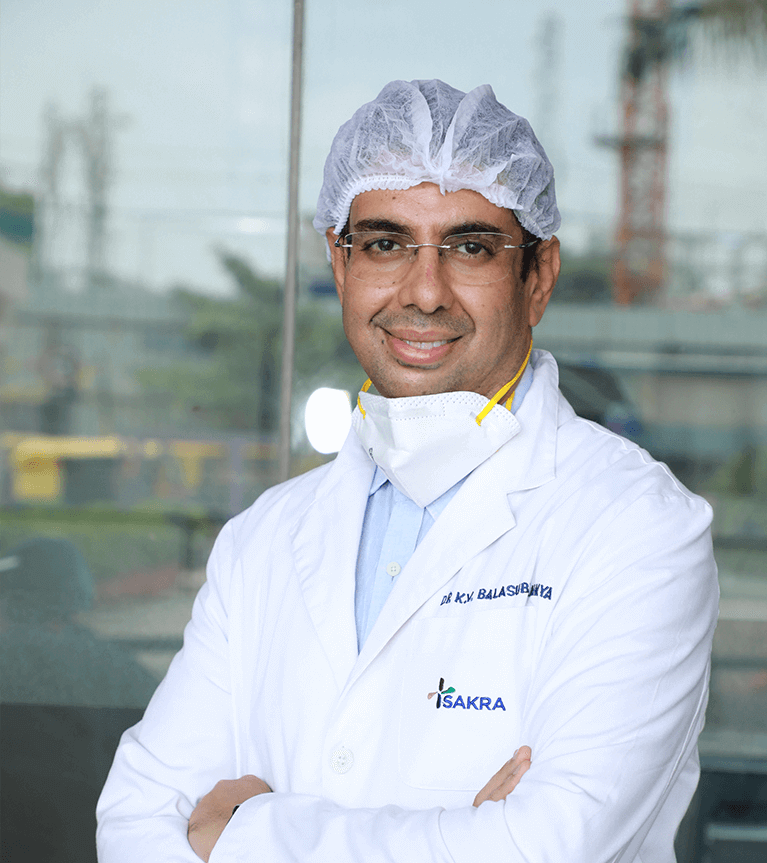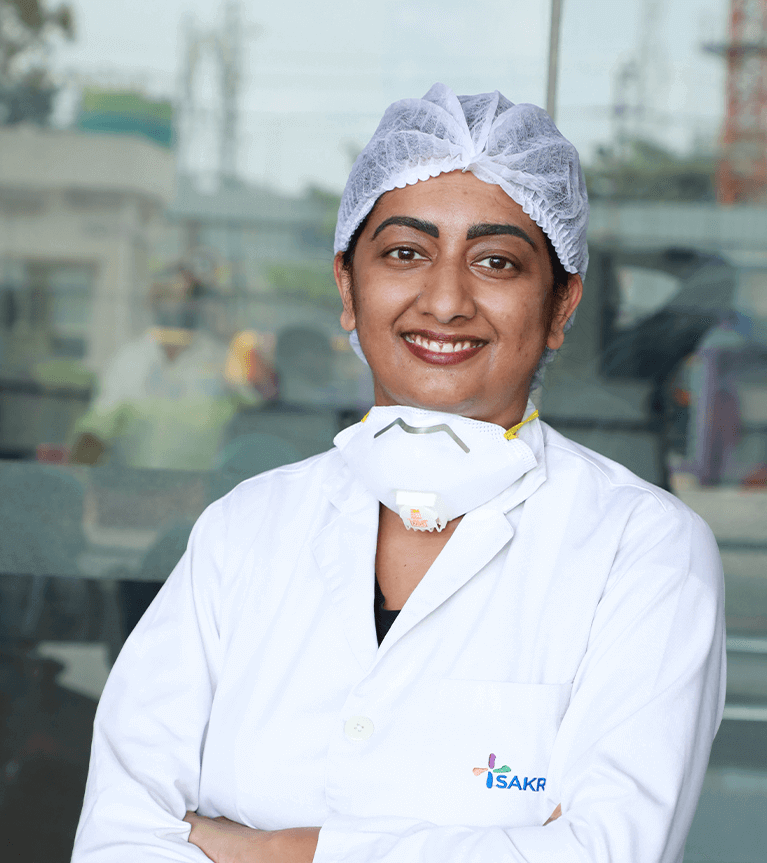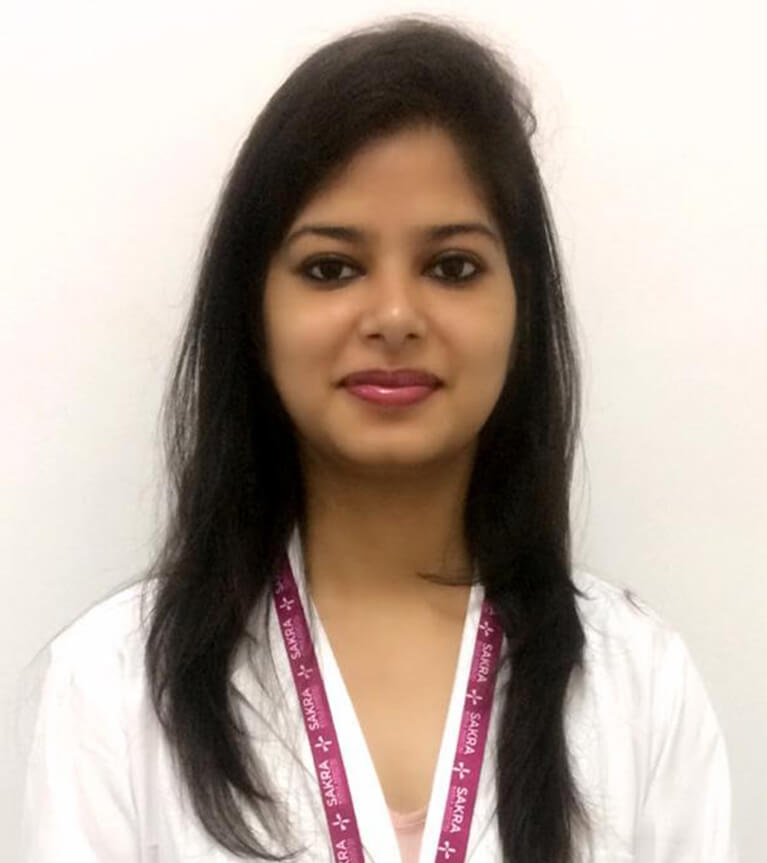The various procedures carried out through the department of dentistry at Sakra are as follows.
1. ENDODONTICS
Endodontics deals with the processes such as single sitting root canal treatment for anterior and posterior teeth and post and core for teeth with fractured tooth structure.
2. COSMETIC DENTISTRY
Cosmetic dentistry deals various processes such as cavity fillings with tooth coloured fillings fractured tooth restorations crowns for Diastema closure.
3. PERIODONTICS
Periodontics is a specialty under dentistry which deals with processes like scaling (cleaning) using ultrasonic, subgingival scaling(Deep Scaling), Root Planing, curettage, bone grafts, flap surgery, periodontal splinting for mobile teeth, gingivectomy, Gingivoplasty, Coronoplasty, Ankyloglossia (Tongue Tie), Local Drug Delivery, GTR (guided tissue regeneration).
4. ORTHODONTICS (ALIGNMENT OF IRREGULAR TEETH) & DENTOFACIAL ORTHOPAEDICS
The orthodontics department deals with dental correction including but not restricted to correction of crowded teeth, correction of protruded teeth, habit breaking therapy etc.
5. ORAL AND MAXILLOFACIAL SURGERY
Oral and maxillofacial surgical practises include various procedures like surgical extractions, extraction of impacted tooth, incision and drainage of facial space infections, excisional biopsy, excision of tumors and cysts, skeletal jaw defect surgeries, alveolar dental fractures.
6.IMPLANTOLOGY
Implantology department deals with dental implants and various procedures undertaken by the implantologist.
7. PROSTHODONTICS
Prosthodontics department undertakes procedures like crown and bridge work, removable partial dentures, fixed partial dentures, precision attachments, obturators, implant supported prosthesis, complete dentures, full mouth rehabilitation.
Basic dentistry like diagnosis and treatment planning, simple extractions, restorations, oral prophylaxis.
8. ADVANCED LASER DENTISTRY
Laser Excision, Laser Biopsy, Laser De-pigmentation, Laser Bleaching, Laser Flap Surgery, Laser Curettage, Laser Debridement, Laser Gingivectomy, Laser Gingivoplasty, Laser Coronoplasty, Laser Ankyloglossia (Tongue Tie).
9. CONSERVATIVE & ENDODONTIC DENTISTRY
Restorative Dentistry, Root Canal Treatment (Single Visit), Re Root Canal Treatment, Apicoectomy,
10. PAEDONTICS & PREVENTIVE DENTAL TREATMENT PROCEDURES
Pit And Fissure Sealants, Pulpectomy (Rct), Pulpotomy, Crowns, Habit Breaking Appliances, Space Maintainers, Fluoride Applications.
11. CROWNS AND BRIDGES
All Ceramic Crowns - Zirconia, 3m, Amann Girrbach Crowns, Inlay & Onlay, Metal With Ceramic Crowns And Bridges.
12. GENERAL DENTISTRY
Ultrasonic Scaling And Polishing,Restorative Dentistry, Extractions, Dental X-ray – Rvg, Opg, Ct.
13. STERILISATION CONCEPT
The dentistry department at Sakra follows rigorous dentistry protocols to ensure the safest and cleanest environment for the procedures undertaken. The department has a total infection control system consisting of disposable diagnostic instruments, disposable gloves, mouthmasks ,headcaps and gowns, autoclave, hygienic conditions and excellent ambience.



In the realm of personal health and hygiene, dental care often takes a central role. Our oral health not only influences our ability to eat and speak but also impacts our overall well-being. Neglecting dental
The gleam of a healthy smile is often attributed to pearly white teeth, but the real hero behind that glistening surface is the hard, mineralized layer called enamel. It acts as the teeth's first
The dental landscape is undergoing a significant transformation, driven by the integration of cutting-edge digital technologies, including digital imaging in dentistry. From intraoral scanners to 3D printing, digital dentistry is revolutionizing the way dentists
Citrus fruits are a cornerstone of a healthy diet. They're loaded with vitamin C, antioxidants, and other essential nutrients that do wonders for our overall health. But, for teeth, these tangy treats can pose
Oral hygiene is a crucial aspect of overall health and well-being that often goes underestimated. Neglecting oral health can lead to a range of dental problems and even impact your systemic health. In this comprehensive
A stunning smile is not just about aesthetics; it reflects your overall health and well-being. Maintaining good dental health and oral hygiene practices is essential for achieving that radiant smile and ensuring your teeth and
Pregnancy is an exciting and transformative time for many women, but it also comes with a set of unique health concerns and considerations. One of these concerns is dental care, as changes in hormones and
A healthy smile goes beyond having sparkling white teeth; it also involves maintaining healthy gums. Healthy gums provide the foundation for strong teeth and a beautiful smile. Unfortunately, gum problems are common and can lead
Maintaining healthy teeth is important for both our oral health and overall well-being. While brushing and flossing play a crucial role in maintaining good oral hygiene, our diet also plays a significant role. Vitamins and
When it comes to dental restorations, crowns play a crucial role in restoring the function, aesthetics, and strength of damaged teeth. A dental crown is a tooth-shaped cap that is placed over a prepared tooth,
Good dental health can have a positive impact on a person’s quality of life and help in preventing health problems. Many people tend to ignore their oral hygiene which ends up costing them later with
Laser teeth whitening is a technique for brightening an individual’s teeth. It differs from other teeth whitening techniques and it uses a bleaching gel and a laser which is a high-intensity light beam.
A
When it comes to our overall health, we often focus on monitoring things like our weight, blood pressure, and heart rate. However, there's one body part that can often give us important clues about our
A tooth extraction can be a daunting experience, whether it's a simple or surgical procedure. The idea of having a tooth removed can cause anxiety and uncertainty, which is why it's important to be well-informed
Digital Smile Design is a one-of-a-kind dental treatment planning tool that improves diagnostic vision, predictability, and interaction between dental providers and their patients. In simple words, Digital Smile Design is a technical tool that is
Oral psoriasis is a type of psoriasis that affects the mouth and the areas around it, such as the lips and the inside of the cheeks. It is a chronic autoimmune condition that causes red,
Tongue biting is when a person bites their own tongue, either accidentally or on purpose. This happens for a variety of reasons, such as when a person is having a seizure or if they are
What is dry mouth?
Dry mouth, also known as xerostomia, is a condition in which the salivary glands in the mouth do not produce enough saliva to keep the mouth moist. Saliva is essential for maintaining
If a child's permanent teeth are not erupting as expected, it is important to consult with a dentist to determine the underlying cause and develop a treatment plan. There are several possible reasons
When we have missing teeth, there is a need to replace them. Missing teeth will cause problems like difficulty in eating, speech, migration and rotation of adjacent teeth. It would also affect the chewing load
A sinus lift is one of the bone ridge-increasing procedures. It is to increase the amount of bone in the posterior jaw area. Ridge is the area where teeth are embedded in sockets.
There is
Dentures are a prosthetic replacement of missing teeth. Dentures can be removed and used to replace missing teeth in our mouth. Dentures help in preserving the remaining firm teeth in place and maintain the face
It’s the weekend. You have enjoyed a lovely dinner with your friends and family. You are back home, all tired, and wanting to hit the bed. But you know the drill - you got to
A broken tooth does not only cause oral problems but also breaks your confidence. Even though your teeth's enamel is the hardest and most mineralized tissue in your body, it has its limits. Some of
Restorative dentistry means the various options available in the dental world to fix, repair or replace damaged, frustrated or broken teeth. The purpose of restorative dentistry is to save teeth while also restoring their natural appearance,
The branch of dentistry that focuses on dental treatment for the elderly is known as geriatric dentistry. The entire elderly population requires diagnosis, management, prevention and treatment of dental problems associated with age-related diseases. The mouth
Have you recently had your partner or parent tell you that you grind your teeth during sleep or have you caught yourself grinding or clenching your teeth during the day? Grinding, clenching or gnashing your teeth
Dental trauma is physical injury to the gums, teeth, the alveolar bone (the bone that holds the tooth sockets), or the soft tissue of the mouth like the lips and tongue. Accidents or sports injuries are
Are you advised for wisdom tooth removal? Worried about the procedure? We have you covered! The four wisdom teeth or the molars, located at the far end of the jaw are the last molars. These teeth
Tooth Decay or Cavities are one of the most chronic infectious diseases of childhood. We come across some parents who ignore the early symptoms of tooth decay thinking they are baby teeth and the child
Teething is the process by which a baby's teeth erupt. We usually term it as a breakthrough. Teeth develop at the age between 6 to 24 months. The first set of primary teeth occur when
Gum bleeding is common and most of the time, not very serious. Bleeding gums are inflamed or irritated pink tissue around the mouth which bleeds easily. After brushing or flossing, an individual may notice blood,
Veneers are a great way to improve your smile, especially if your teeth are chipped, misaligned, discoloured or have gaps. Veneers are thin, tooth-coloured shell coverings that are placed over the front (visible) part of
Crooked or misaligned teeth are very common. Do you ever look at somebody with perfectly straight teeth and question how lucky they are to have perfectly straight teeth with a beautiful smile? Well, we are here
We all know adults have 32 teeth. If you are an adult reading this, can you count your teeth now? Did you just count 33? Well, don’t panic. This is a condition known as Hyperdontia. Hyperdontia
Are you experiencing dental discomfort when sipping on hot or ice-cold beverages? Do you find yourself bleaching while brushing or flossing? If you are, you are suffering from dentinal hypersensitivity or tooth sensitivity. Tooth sensitivity is an
Clear aligners or invisible aligners have become a popular option in the field of orthodontics. They are a type of orthodontic treatment that corrects misaligned or crooked teeth. The aim of clear or invisible aligners
In the medical and healthcare world, when you hear the word “stones” it is probably and more often thought of to be “kidney stones”. However, another type of stone that people have never heard of
More often than not, oral health takes a back seat. We tend to take budding oral health issues for granted, thinking, it will not cause major harm to our overall health. Do you think the same?
Tooth decay is the damage done to a tooth's surface or enamel. Anyone can be a victim of tooth decay - children, teens or adults. If tooth decay is not treated in its earliest stage,
Worldwide lack of awareness especially in developing countries like India is causing more oral complications in patients with diabetes. However, it is not certain for oral complications to appear in the oral cavity from the
People suffer tooth loss due to many reasons - tooth decay, periodontal disease, or oral injury. What a lot of patients do not understand is that missing teeth are not just cosmetic issues, they also
Aphthous Ulcers (also known as aphthous stomatitis, canker sores), are a common and painful problem and can make eating and talking difficult. . An aphthous ulcer is an ulcer that forms on the mucous membranes
Has the dentist advised you to undergo a root canal treatment? Are you looking for all the necessary information about a root canal procedure before you go ahead? The article discusses everything you would need to
Do you notice slight blood in the sink every time you brush your teeth? Do you see blood while biting into an apple? This bleeding is one of the first warning signs of gum disease.
An oral mucocele is a harmless, benign, fluid-containing, salivary gland cyst. Most commonly, it occurs as a swelling on the lower lip or mouth lining (mucosa). The mucocele has a translucent bluish colour and is commonly
The term pyorrhea comes from the Greek words Discharge of Pus.
Pyorrhea, also known as periodontitis, is a multifactorial disease that directly affects oral gums and the bone. Yes, Pyorrhea affects the periodontium, that is,
Pulpitis is an inflammation of the dental pulp tissue and is usually caused by bacterial infections (majorly tooth decay). The pulp comprises the blood vessels, the nerves and connective tissue which provide blood and nutrients
Everyone wants to have good dental health. While most of us do not face severe dental health problems, the majority of people face the problem of Malocclusion of Teeth. What Is Malocclusion? Malocclusion! You might have probably
What is Gingivitis and how to treat it? Gingivitis is a type of common and mild gum disease that may cause irritation, redness, and swelling of your gums or gingiva, the part of your gums surrounding
Mouth-body connection is the best way to monitor our health — and that our diet is the cause of many problems in our mouth including rotten teeth to inflamed gums. Tooth tissue loss is a
Low Level Laser Therapy: An Untapped Resource in Dentistry Wounds involving the oral mucosa and jaw bones are commonly encountered in oral surgical practice. Tooth extraction is the most common surgical procedure performed by dentists or
Surgical removal of impacted teeth is one of the most common procedures performed by oral and maxillofacial surgeons. It involves the manipulation of both hard and soft tissue that can cause several postoperative complications. Pain,
What are Invisalign braces? Everybody deserves a great smile, but a lot of us are either embarrassed or need help with the perfect smile. In recent years, a lot of people are using clear orthodontic devices
Bleeding gums are inflamed or irritated pink tissue around the mouth which bleed easily. Bleeding gums is a common problem of oral health. If your gums bleed while brushing or flossing, you might shrug it
There’s nothing more heartwarming than a baby’s toothless grin. Except maybe the smile of a baby with healthy teeth and gums. After all, just because we call them ‘baby teeth’ doesn’t mean they don’t require
Gingivitis is a condition in which there is inflammation of the gums or gingiva. It is caused by a layer of plaque or bacteria accumulating on the teeth. Gingivitis is a common type
Do you think you might have the gum disease? Take the Gum Disease Test! How does gum disease arise? When bacteria start to form along the gum line and between the teeth where it cannot be clearly
A denture is a removable replacement for missing teeth and surrounding tissues. Two types of dentures are available -- complete and partial dentures. Complete dentures are used when all the teeth are missing,